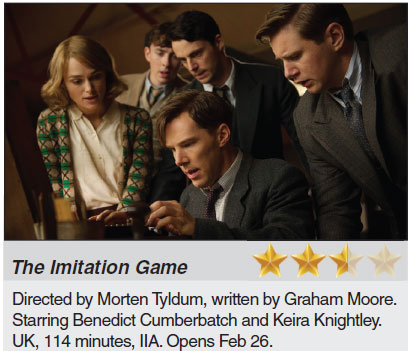Imitation of life
Updated: 2015-02-13 07:37
(HK Edition)
|
|||||||
In 1952, Cambridge mathematician, intelligence pro and unsung war hero Alan Turing was arrested for indecency; he was gay. He was chemically castrated and lost his security clearance. Turing also essentially invented the computer. If anyone deserves a biopic, it's him.
The Imitation Game could do a lot more for Turing's legacy. For a film about a man that (arguably) won WWII, saved millions of lives, and did so while brutalizing his own identity it's remarkably toothless and lacking dramatic punch. The story of Turing (Benedict Cumberbatch) and the codebreakers deciphering the German Enigma machine at Bletchley Park (British spy central) during WWII unfolds as Turing in '52 relays the details to the suspicious detective investigating a burglary at his home. He was recruited by Commander Denniston and the previously unheard of MI6 boss Stewart Menzies (Charles Dance and Mark Strong, both gorgeously bureaucratic and imposing) to work on the cipher, as was Joan Clarke (Keira Knightley), a kindred spirit facing her own gender-based struggles and who was engaged to Turing for a stretch. A vaguely arrogant, awkward man with weak social graces, he remained an outsider even as his genius brought Bletchley success.
Norwegian director Morten Tyldum is best known for the taut, intensely Scandinavian thriller Headhunters, and here he coats the film with a veneer of studied Englishness that makes the end product feel like an artifact to be looked at rather than a tale to connect with. The script is littered with dramatic beats better suited to a television movie (the mid-century macho types finally accept him with beer, the team unites in solidarity with Turing when he's about to be fired) and never really delves into Turing's genius, his life as a gay man in the 1940s or the moral quagmire that arose from cracking the code. Even the final moments revolving around the barbaric sentence Turing accepted seems more designed to give Cumberbatch his Big Moment rather than relay a sense of fury, injustice or simply sadness. The Imitation Game is handsome with period detail and well mounted, but it's also bland, paint-by-numbers storytelling about a subject that deserves better.

(HK Edition 02/13/2015 page7)